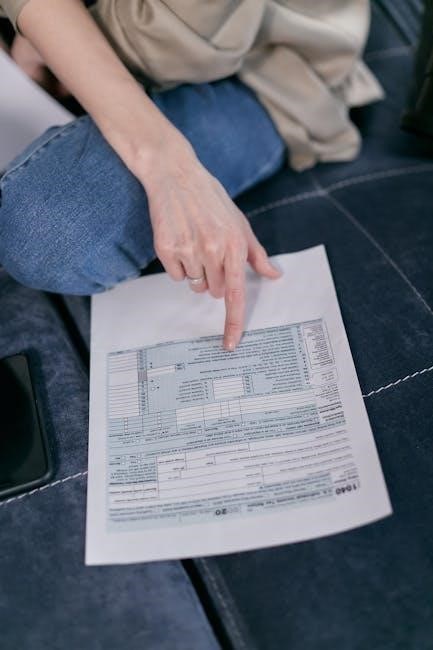Purpose of Form 592-PTE
Form 592-PTE is used to report pass-through entity (PTE) withholding on California source income‚ ensuring compliance with state tax laws and providing necessary data for tax administration annually․
1․1․ Overview of Form 592-PTE
Form 592-PTE is an annual form used to report pass-through entity (PTE) withholding on California source income․ It is designed for entities like partnerships‚ S corporations‚ estates‚ and trusts to comply with state tax requirements․ The form ensures accurate reporting of withholding amounts and provides the Franchise Tax Board (FTB) with essential data for tax administration․ It is typically filed by April 15th or June 15th for calendar-year entities‚ aligning with federal extensions․ The form is complemented by Form 592-Q for quarterly payments‚ ensuring timely remittance of withholding taxes throughout the year․ Its purpose is to maintain transparency and accountability in withholding obligations for California-sourced income․
1․2․ Primary Use of Form 592-PTE
The primary use of Form 592-PTE is to report pass-through entity (PTE) withholding on California source income․ It is specifically designed for entities such as partnerships‚ S corporations‚ estates‚ and trusts to disclose the total withholding amounts for nonresident owners or members․ The form ensures compliance with California tax laws by providing detailed information about the withholding amounts‚ payment periods‚ and entity details․ It is typically filed annually by January 31st following the tax year․ Failure to file this form accurately may result in penalties and interest․ Form 592-PTE is a critical component of California’s tax reporting system for pass-through entities with nonresident owners․
1․3․ Entities Required to File Form 592-PTE
Entities required to file Form 592-PTE include pass-through entities (PTEs) such as partnerships‚ S corporations‚ estates‚ and trusts․ These entities must file the form if they have withheld taxes on California source income for nonresident owners or members․ Additionally‚ foreign partners or members of PTEs may also trigger the filing requirement․ The form is mandatory for any PTE that has made withholding payments during the tax year․ Failure to file Form 592-PTE can result in penalties and interest․ It is essential for all eligible entities to comply with this requirement to ensure proper tax reporting and avoid any potential legal consequences․
Structure of Form 592-PTE
Form 592-PTE consists of key sections for reporting pass-through entity withholding‚ including entity details‚ withholding amounts‚ and payment schedules‚ ensuring accurate annual submission to the FTB․
2․1․ Key Sections of Form 592-PTE
Form 592-PTE is divided into key sections to streamline reporting․ Section I includes pass-through entity (PTE) information‚ such as name‚ address‚ and tax identification number․ Section II details withholding amounts‚ including California source income and total withholding for the year․ Section III covers payment schedules‚ showing quarterly withholding payments made․ Section IV includes certifications and signatures‚ ensuring compliance and accuracy․ Additional schedules may be required for specific cases‚ such as foreign partners or supplemental payments․ Each section is designed to ensure accurate reporting and compliance with California tax laws‚ making it essential to complete all parts thoroughly․
2․2․ Information Required for Completion
To complete Form 592-PTE‚ taxpayers must provide specific details‚ including the pass-through entity’s name‚ address‚ and tax identification number․ Information about California source income‚ total withholding amounts‚ and quarterly payments is essential․ The form also requires disclosure of payments made using Form 592-Q and any supplemental payments․ Additionally‚ details about nonresident owners‚ foreign partners‚ or members may be necessary․ Accurate reporting of all withholding activities ensures compliance with California tax laws․ Proper documentation and adherence to formatting guidelines are crucial for timely and accurate submissions to the Franchise Tax Board (FTB)․
2․3․ Supplements and Schedules
Form 592-PTE may require additional supplements or schedules to provide detailed information․ For example‚ if quarterly payments are made using Form 592-Q‚ this must be submitted alongside the annual Form 592-PTE․ Supplements may include schedules for nonresident owners‚ foreign partners‚ or members‚ ensuring accurate reporting of withholding amounts․ The form also allows for supplemental payments if additional withholding is required beyond the quarterly estimates․ Properly completing these supplements ensures compliance with California tax regulations and avoids penalties․ Detailed instructions for each supplement or schedule are provided in the FTB guidelines to assist filers in meeting all requirements accurately and efficiently․

Who Needs to File Form 592-PTE?
Pass-through entities‚ nonresident owners‚ and foreign partners or members with California source income must file Form 592-PTE to report and remit withholding taxes annually․
3․1․ Pass-Through Entities (PTEs)
Pass-through entities (PTEs)‚ such as LLCs‚ S corporations‚ partnerships‚ estates‚ and trusts‚ must file Form 592-PTE to report withholding on California source income․ PTEs are required to withhold taxes on nonresident owners’ shares of income derived from California sources․ This obligation ensures compliance with state tax laws and proper distribution of tax liabilities․ The form must be submitted annually by January 31 of the following year․ PTEs must also remit quarterly withholding payments using Form 592-Q to avoid penalties․ Failure to comply may result in interest and penalties on underpaid withholding amounts․ PTEs play a critical role in ensuring accurate tax reporting for their owners․
3․2․ Nonresident Owners and Withholding
Nonresident owners of pass-through entities (PTEs) are subject to withholding on their share of California source income․ PTEs must withhold taxes on distributions to nonresident owners to ensure compliance with state tax laws․ Form 592-PTE is used to report the total withholding for nonresident owners‚ ensuring proper tax collection․ The form requires detailed information about each owner’s share of income and withholding amounts․ Nonresident owners must be provided with a statement detailing their withholding‚ which is crucial for their personal tax filings․ Failure to withhold or report accurately may result in penalties and interest․ The annual filing deadline is January 31 of the following year․
3․3․ Foreign Partners or Members
Foreign partners or members of a pass-through entity (PTE) are subject to specific withholding requirements on their share of California source income․ The PTE must report and withhold taxes on distributions made to foreign partners using Form 592-PTE․ This form ensures compliance with California tax laws and proper reporting of withholding amounts․ Foreign partners must be provided with detailed statements outlining their withheld taxes‚ which are essential for their tax filings․ Failure to adhere to these requirements may result in penalties․ The annual filing deadline for Form 592-PTE is January 31 of the following year‚ ensuring timely reporting and payment of withholding taxes for foreign partners or members․

Deadlines and Payment Periods
Form 592-PTE must be filed annually by January 31 of the following year․ Quarterly withholding payments are due throughout the year‚ with extensions available under specific circumstances․
4․1․ Annual Filing Deadline
Form 592-PTE must be filed annually by January 31 of the year following the tax year․ This deadline applies to all pass-through entities required to report withholding on California source income․ Ensure timely submission to avoid penalties․ The form summarizes annual withholding payments made throughout the year․ If the due date falls on a weekend or holiday‚ the next business day is the deadline․ Properly completed forms must include all required schedules and attachments․ Late filing may result in penalties and interest‚ so adherence to the deadline is crucial for compliance with California tax regulations․
4․2․ Quarterly Withholding Payments
Pass-through entities (PTEs) are required to make quarterly withholding payments using Form 592-Q․ These payments are due on the same dates as federal estimated tax payments: April 15‚ June 15‚ September 15‚ and January 15 of the following year․ The payments are based on the withholding liability for California source income․ Form 592-Q is used to remit these quarterly amounts to the FTB․ Importantly‚ these payments are not reported on a per-payee basis‚ meaning no payee schedule is required with the Form 592-Q submission․ The annual Form 592-PTE will summarize all quarterly payments made during the year‚ ensuring compliance with state tax obligations․
4․3․ Extensions and Due Dates
Extensions for filing Form 592-PTE may be requested using Form 592-Q‚ which also serves as a payment voucher for quarterly withholding․ The annual Form 592-PTE is due by January 31st of the year following the tax year․ If additional time is needed‚ the FTB may grant an extension‚ but any remaining withholding liability must be paid by the original due date to avoid penalties․ Extensions are typically for filing‚ not for payment‚ so timely submissions of quarterly payments are crucial․ Failure to meet deadlines may result in late filing penalties and interest on unpaid balances․ The FTB provides guidance on extension requests and due date compliance․

Instructions for Completing Form 592-PTE
Complete Form 592-PTE accurately‚ ensuring all required information is provided․ Follow FTB guidelines for proper submission‚ including handwritten or electronic filing options and necessary signatures․
5․1․ General Filing Requirements
Form 592-PTE must be filed annually by pass-through entities (PTEs) to report withholding on California source income․ The form is due by January 31 following the tax year․ PTEs‚ including LLCs‚ partnerships‚ and S corporations‚ must file if they withheld taxes on behalf of nonresident owners․ Submission can be made electronically through MyFTB or by mail․ Ensure all sections are completed accurately‚ and include Form 592-Q if additional payments are required․ Signatures are mandatory for both electronic and manual filings․ Use the correct form version for the applicable tax year to avoid processing delays․
5․2․ Specific Instructions for Each Section
Complete each section of Form 592-PTE carefully․ In Part I‚ provide the pass-through entity’s (PTE) information‚ including name‚ address‚ and tax year․ Report total withholding and distributions in Part II‚ ensuring amounts align with California source income․ Use Part III for payment details and adjustments․ Attach schedules if additional owners or income details are required․ Use Form 592-Q for quarterly payments and include it with the annual filing if applicable․ Ensure all numerical entries are accurate and avoid using commas or special characters․ Sign and date the form to validate the submission․ Refer to FTB guidelines for complex cases or additional requirements․
5․3․ Handwritten vs․ Electronic Submissions
Form 592-PTE can be submitted either handwritten or electronically․ For handwritten submissions‚ use black or blue ink and avoid using commas or special characters in numerical fields․ Ensure all information is legible and complete․ Electronic filing is recommended for faster processing and reduced errors․ Use the FTB’s Secure Web Internet File Transfer (SWIFT) or MyFTB for Withholding Agents to file electronically․ Handwritten forms must be mailed to the address provided in the instructions․ Regardless of the method‚ ensure accuracy and completeness‚ as errors may delay processing․ For detailed submission guidelines‚ refer to the FTB’s official website or contact their support team․

Submission Methods
Form 592-PTE can be submitted by mailing the completed form to the FTB or through electronic filing via MyFTB‚ with payments made using Form 592-Q․
6․1․ Mailing the Completed Form
To mail the completed Form 592-PTE‚ submit it to the address listed in the FTB instructions․ Ensure the form is signed and includes all required information․ If filing electronically via MyFTB‚ do not mail the form․ Instead‚ submit payments using Form 592-Q․ Include a return address on the envelope for potential correspondence․ Mailing is a secure method for paper filers‚ but ensure timely delivery to meet deadlines․ Always verify the correct mailing address to avoid processing delays․
6․2․ Electronic Filing Options
Electronic filing is a convenient and efficient method for submitting Form 592-PTE․ Taxpayers can file the form electronically through the Franchise Tax Board’s (FTB) MyFTB portal‚ designed for Withholding Agents․ This method ensures faster processing and reduces the risk of errors․ When filing electronically‚ no paper form is required to be mailed․ Payments can also be made online via MyFTB for Withholding Agents or by mailing Form 592-Q․ Electronic submission is recommended for accuracy and timeliness‚ ensuring compliance with California’s tax requirements․ Always verify the FTB’s website for the most up-to-date instructions and filing options․
6․3․ Supplemental Payments and Form 592-Q
Supplemental payments for pass-through entity withholding are made using Form 592-Q‚ which accompanies the annual Form 592-PTE filing․ This form is used to remit quarterly estimated withholding payments to the Franchise Tax Board (FTB)․ If additional withholding is required beyond the annual filing‚ Form 592-Q must be submitted with the payment․ Payments can be made online via MyFTB for Withholding Agents or mailed with Form 592-Q․ Ensure timely submission to avoid penalties․ Always refer to the FTB’s instructions for proper completion and submission of Form 592-Q‚ as it is a critical component of compliance with California’s withholding requirements for pass-through entities․
Amended Returns and Corrections
Amended Form 592-PTE is used to correct errors or omissions in previously filed returns․ Contact the FTB for assistance with filing corrected forms and schedules․
7․1․ Filing an Amended Form 592-PTE
If errors or omissions are identified in a previously filed Form 592-PTE‚ an amended return must be submitted to correct the information․ The amended form should include all corrected data and any additional documentation required․ Taxpayers must clearly indicate that the submission is an amended return․ The Franchise Tax Board (FTB) provides guidelines for filing corrections‚ which may include submitting a new Form 592-PTE with updated schedules․ Payments or refunds resulting from amendments should accompany the corrected form․ Contact the FTB for specific instructions on how to properly file an amended return and ensure compliance with California tax regulations․
7․2․ Correcting Errors or Omissions
To correct errors or omissions on Form 592-PTE‚ taxpayers must submit an amended return․ This ensures accuracy in reporting pass-through entity withholding․ The amended form should clearly indicate changes and include updated schedules or statements․ The Franchise Tax Board (FTB) provides specific guidelines for corrections‚ which may require additional documentation․ Taxpayers should review the form instructions carefully and address any discrepancies promptly․ If withholding amounts or payee information was incorrect‚ the amended form must reflect the accurate details․ Corrections should be submitted as soon as possible to avoid penalties or interest․ The FTB may request further information to process the amended return․
7․3․ Contacting the FTB for Assistance
Taxpayers can contact the Franchise Tax Board (FTB) for assistance with Form 592-PTE by visiting their official website at ftb․ca․gov․ The website provides detailed instructions‚ forms‚ and FAQs to address common questions․ For specific inquiries‚ taxpayers can call the FTB toll-free number or submit a request through their online portal․ Additionally‚ the FTB offers live chat support during business hours for immediate assistance․ Taxpayers may also mail their questions or concerns to the address listed in the form instructions․ The FTB encourages taxpayers to seek help early to ensure compliance and avoid delays in processing their returns․
Penalties and Interest
Penalties and interest apply for late filing‚ underpayment‚ or accuracy issues․ Consult the FTB to ensure compliance and avoid additional fines․
8․1․ Late Filing Penalties
The Franchise Tax Board (FTB) imposes penalties for late filing of Form 592-PTE․ A penalty of 5% of the unpaid withholding amount applies for each month or part of a month the form is late‚ up to 25%․ Additionally‚ a minimum penalty of $135 may be assessed if the tax is not paid by the due date․ Late filing can also result in interest on the unpaid balance‚ calculated from the original due date․ Exceptions may apply if the PTE can demonstrate reasonable cause for the delay․ Timely filing and payment are crucial to avoid these penalties and ensure compliance with California tax regulations․
8․2․ Underpayment of Withholding
If a pass-through entity (PTE) underpays its withholding liability‚ the Franchise Tax Board (FTB) may impose penalties and interest․ The penalty for underpayment is 5% of the unpaid amount for each month or part of a month‚ up to a maximum of 25%․ Additionally‚ a minimum penalty of $135 may apply if the tax remains unpaid by the due date․ Interest accrues on the unpaid balance starting from the original due date․ The PTE may avoid penalties by showing reasonable cause for the underpayment․ Timely and accurate payment of withholding is essential to avoid these consequences and ensure compliance with California tax regulations․
8․3․ Accuracy-Related Penalties
Accuracy-related penalties may apply if the Franchise Tax Board (FTB) identifies errors or omissions in Form 592-PTE submissions․ These penalties are typically imposed when there is negligence‚ disregard of tax rules‚ or substantial understatements of liability․ The penalty is generally 20% of the underpayment resulting from these inaccuracies․ To avoid such penalties‚ entities must ensure all reported information is accurate and complete․ Reasonable cause for errors may be considered to waive penalties․ Proper documentation and adherence to filing instructions are crucial to prevent accuracy-related issues and ensure compliance with California tax regulations․ Timely corrections and transparency are key to mitigating such penalties․

California-Specific Requirements
Form 592-PTE must comply with California-specific rules‚ including accurate reporting of California source income and adherence to state withholding requirements for pass-through entities and nonresident owners․
9․1․ California Source Income
California source income includes wages‚ rents‚ royalties‚ and other income derived from California-based activities․ Pass-through entities (PTEs) must withhold and report taxes on this income for nonresident owners․ Form 592-PTE is used to detail the total withholding on California source income‚ ensuring compliance with state tax laws․ The form requires accurate reporting of income sourced to California and the corresponding taxes withheld․ PTEs‚ such as partnerships‚ S corporations‚ and limited liability companies‚ must file annually by January 31st․ Proper identification of California source income is critical to avoid penalties and ensure accurate tax reporting for both the entity and its owners․
9․2․ FTB Contact Information
The California Franchise Tax Board (FTB) provides essential contact information for assistance with Form 592-PTE․ Taxpayers can visit the official FTB website at ftb․ca․gov for detailed guidelines‚ forms‚ and resources․ For specific inquiries‚ the FTB can be reached by phone or mail․ The main mailing address is Franchise Tax Board‚ PO Box 942840‚ Sacramento‚ CA 94240-0040․ Additional contact details‚ including phone numbers for customer service and technical support‚ are available on the FTB website․ This information is crucial for resolving issues related to filing‚ payments‚ or amendments to Form 592-PTE‚ ensuring timely and accurate communication with the FTB․
9․3․ State-Specific Withholding Rules
California imposes specific withholding rules for pass-through entities (PTEs) to ensure compliance with state tax laws․ PTEs must withhold taxes on income distributable to nonresident owners‚ ensuring accurate reporting of California source income․ The FTB mandates annual filing of Form 592-PTE by January 31st‚ with quarterly payments due using Form 592-Q․ Additional rules apply to foreign partners or members‚ requiring the use of Form 592-F․ The state-specific regulations ensure proper remittance of withholding taxes‚ avoiding penalties․ Taxpayers must adhere to these rules to maintain compliance and avoid penalties or interest․ For detailed guidance‚ refer to the FTB website or consult tax professionals to navigate California’s unique requirements effectively․

Additional Resources
For more information‚ visit the FTB website․ Review related forms like 592-Q and 592-F․ Consult tax professionals for complex cases to ensure compliance․
10․1․ FTB Website and Guidelines
The Franchise Tax Board (FTB) website provides comprehensive resources for completing Form 592-PTE․ Visit the dedicated page for Form 592-PTE to access instructions‚ downloadable forms‚ and FAQs․ Use the search feature to find specific guidance on pass-through entity withholding and California source income․ The site also offers detailed sections on filing requirements‚ payment methods‚ and deadlines․ Additionally‚ you can find information on related forms‚ such as Form 592-Q for quarterly payments․ The FTB website is the primary source for staying updated on tax law changes and ensuring compliance with California’s withholding regulations․ Utilize these resources to accurately prepare and submit your return․
10․2․ Related Forms and Publications
Several forms and publications are essential for accurately completing Form 592-PTE․ Key related forms include Form 592-Q‚ used for quarterly pass-through entity withholding payments‚ and Form 592‚ the Resident and Nonresident Withholding Statement․ Additionally‚ Form 592-F is required for withholding related to foreign partners or members; The FTB 1120 and FTB 100 forms provide further guidance for corporations and pass-through entities‚ respectively․ Publications such as the California Income Tax Withholding Guidelines and FTB Notice 2023-XX offer detailed instructions․ These resources ensure compliance with California tax laws and simplify the filing process․ Always refer to the most recent versions of these forms and guidelines for accurate submission․
10․3․ Professional Assistance
For complex situations‚ consulting a tax professional or the Franchise Tax Board (FTB) is recommended․ The FTB website offers detailed guides‚ FAQs‚ and contact information for assistance․ Tax attorneys‚ CPAs‚ and enrolled agents specializing in California tax law can provide tailored advice․ Additionally‚ the FTB’s Customer Service can address specific questions or clarify filing requirements․ For entities with foreign partners or unique withholding scenarios‚ professional consultation ensures compliance and avoids penalties․ Utilize these resources to navigate the intricacies of Form 592-PTE effectively․
